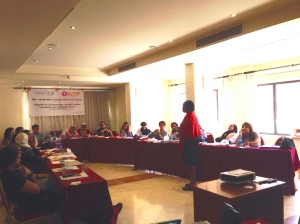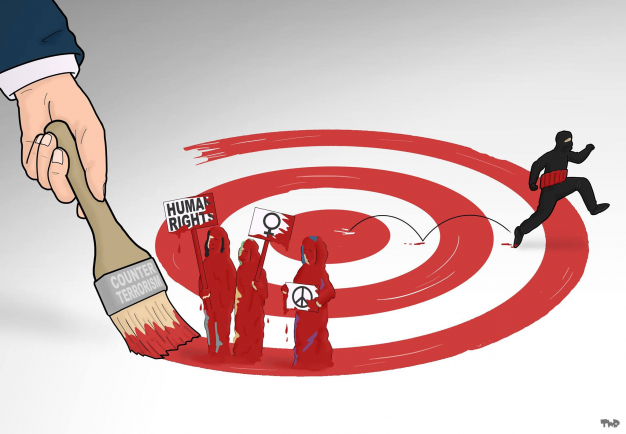Last week, the Women Peacemakers Program (WPP), together with ABAAD – Resource Center for Gender Equality, brought together 16 men and women peacemakers from various organizations based in the Middle East and North Africa (MENA) region, for the first training week of the MENA regional Training of Trainers (ToT) Cycle “Together for Transformation: Gender-Sensitive Nonviolence for Sustainable Peace”.
The training consisted of a combination of theory and skills-building sessions on Gender-Sensitive Active Nonviolence (GSANV), integrating a masculinities perspective in peace and security, and Women, Peace and Security (WPS) lobby and advocacy. Much of the curriculum built on the insights and recommendations coming out of the WPP-ABAAD MENA regional consultation, held in Jordan during May 2014, attended by 19 civil society representatives from the region.
The training week proved to be an inspiring and empowering experience for the participants and the various trainers involved. Though the training was filled with the theory of active nonviolence, UNSCR 1325 and lobby & advocacy, much space was given to the participants to actively share their personal experiences in peace and security, connecting the theory with regional practices and enabling peer learning.  During the first day of the training, the participants took a closer look at notions of power and the theory and practice of active nonviolence. Netsai Mushonga, one of the trainers, challenged the participants to explore their own understandings of active nonviolence, and jointly come up with a definition of nonviolence they could identify with, as well as apply in their peace work in the region. With participants coming from different contexts and backgrounds, this assignment resulted in lively discussions, ultimately resulting in the definition “Challenging militarization and violence through peaceful means of behavior, based on respect for diversity”.
During the first day of the training, the participants took a closer look at notions of power and the theory and practice of active nonviolence. Netsai Mushonga, one of the trainers, challenged the participants to explore their own understandings of active nonviolence, and jointly come up with a definition of nonviolence they could identify with, as well as apply in their peace work in the region. With participants coming from different contexts and backgrounds, this assignment resulted in lively discussions, ultimately resulting in the definition “Challenging militarization and violence through peaceful means of behavior, based on respect for diversity”.
During one of the sessions of the second day, participants watched and discussed the film “Pray the devil back to hell”, which documents the nonviolent activism of Liberian women to end the violent conflict in their country. Providing much inspiration to the participants, the film generated a lot of discussion about the role women play in peace and security affairs.
The following days focused on the concepts gender and identities, and how these relate to notions of violence, war and peace. Anthony Keedi from ABAAD broadened the gender discussion by introducing the concept of masculinities. Together with the participants, he explored the connections between masculinities and violence on the individual level. Building on the groups’ insights and experiences, the discussions lead to looking at the role gender plays in shaping identity in relation to age, ethnicity, class, etc. Using practical exercises, the group discussed the difference between equality and equity, as well as the importance to emphasize the need for meaningful participation of women instead of just talking about women’s inclusion. The importance of meaningful inclusion was further discussed as people analyzed the situation in the region:
“Not getting the chance the speak is the same as being excluded from the entire meeting. When you are excluded you feel undermined and under appreciated. It also creates a sense of anger, which can lead to violence. This explains so many conflicts in the region, with many groups being excluded from participation. However, after the Arab Uprising, this same dynamic happened all over again. Again, people were not given space to express their views, to engage, and to have ownership”
Connecting gender analysis and nonviolence theory, participants delved deeper into the topic of militarism and the multi-faceted militarization of every day life:
"Our people are armed people. Everyone has a weapon in the house. It is also common for women to use weapons. Many women in times of crisis have access to machine guns."
"We don’t have an open war in our country, but we have a military regime, with much of the national budget going to the military. We also have a high level of patriotism, there is always fear of the enemy, which gives the military the mandate to control." The last part of the training week focused on UNSCR 1325 implementation. Various aspects of lobby and advocacy were introduced, starting with an analysis of what needs to change in the countries for women to participate in political processes. Barbro Svedberg from WILPF shared insights on global lobby and advocacy opportunities, linking UNSCR 1325 to the Convention to Eliminate All Forms of Discrimination Against Women (CEDAW) and Recommendation 30. GPPAC Liaison Officer Amira Sobeih provided a presentation on the League of Arab States (LAS), and possibilities to link local initiatives on UNSCR 1325 to this level.
Using the situation in Yemen as a case study, the group discussed different lobby and advocacy strategies, with the outcome of drafting an open letter to the LAS urging them to stop the armed attacks on Yemen immediately. The open letter was sent via a contact person to the LAS, and will be further disseminated via organizations’ own communication channels. You can read the letter here.
At the end of the training, the group drafted a list of regional challenges and recommendations in regards to the implementation of UNSCR 1325, to submit to the USNCR 1325 Global Study process, which is currently taking place. Many ideas for follow-up initiatives were shared, illustrating the connections and new ideas formed during the intense training week.
"When I go home I will use the skills on active nonviolence to work on the political issues we need to change in my country. I realized that we as women have a voice, and can do something similar to the Liberian experience we saw in the film."
WPP is looking forward to the participants’ ongoing work in their countries, as well as to meeting and connecting with everybody again for the second training week of the ToT Cycle at the end of 2015.
11 Dec '17 This month WPP staff interviewed Arbia Jebali and Sarah Chamekh from Free Sight Association in Tunisia about the work their organization does, how civil society space has changed over the years, which challenges they are facing now, and how civil society in Tunisia is organizing itself to overcome those challenges.
7 Nov '17 In this article, WPP staff interviewed Doron Joles of XminY Fund, an activist organization that supports social movements, action groups and changemakers fighting for a fair, democratic, sustainable and accepting world. He discusses the unique way they have chosen to hand out funds, and the challenges that go along with funding small activist organizations in the current global climate.

25 Oct '17 This Friday, the UNSCR 1325 Open Debate will take place once again, seventeen years since the adoption of landmark UN Security Council Resolution 1325 on Women, Peace and Security. In this article WPP staff reflects on the progress made for a truly transformative feminist peace agenda until now.
